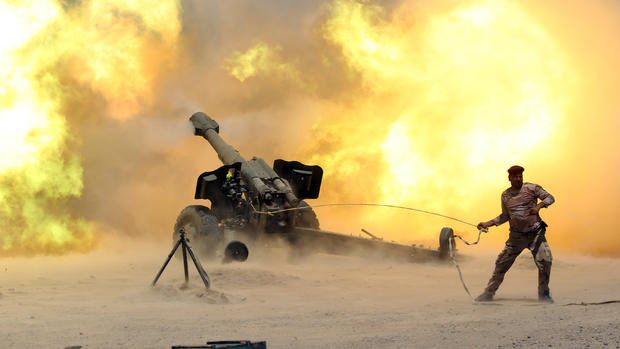Baghdad bombings kill dozens celebrating holiday
BAGHDAD - A suicide truck bomb in downtown Baghdad killed 115 people and wounded nearly 200 others who were out shopping and celebrating early Sunday ahead of the holiday marking the end of Ramadan, security and medical officials said.
The attack, claimed by the Islamic State of Iraq and Sria (ISIS,) was the deadliest in months in the Iraqi capital, and came despite a series of recent gains against the extremists, including the capture of Fallujah, which was believed to have been a source of such attacks.
ISIS claimed responsibility for the bombing in a statement posted online, saying they had deliberately targeted Shiite Muslims. The bombings demonstrated the extremists' ability to mount significant attacks despite major battlefield losses.
At dawn Sunday, fire fighters were still working to extinguish the blazes and bodies were still being recovered from charred buildings. Many of the dead were children, according to Associated Press reporters at the scene. Ambulances could be heard rushing to the site for hours after the blast. An eyewitness said the explosion caused fires at nearby clothing and cellphone shops.
The bomb went off shortly after midnight in a crowded shopping area in the central Karada district, killing at least 115 people and wounding 187, according to a police official. The dead included at least 15 children, 10 women and six policemen. At least twelve other people were still missing and feared dead.. Most of the victims were inside a multi-story shopping and amusement mall, where dozens burned to death or suffocated, officials said.
"It was like an earthquake," said Karim Sami, a 35-year-old street vendor. "I wrapped up my goods and was heading home when I saw a fire ball with a thunderous bombing. I was so scared to go back and started to make phone calls to my friends, but none answered," the father of three added.
He said that one of his friends had been killed, another was wounded and one was still missing.
Hours after the bombing, Iraq's prime minister visited the blast site. Video footage uploaded to social media showed an angry crowd, with people calling Prime Minister Haider al-Abadi a "thief" and shouting at his convoy.
In the second attack, an improvised explosive device went off in eastern Baghdad, killing 5 people and wounding 16. No group claimed responsibility for the attack.
The casualty figures were confirmed by police and hospital officials, who spoke anonymously because they were not authorized to release information to the press.
The Baghdad attacks come just over a week after Iraqi forces declared the city of Fallujah "fully liberated" from ISIS. Over the past year, Iraqi forces have racked up territorial gains against ISIS, retaking the city of Ramadi and the towns of Hit and Rutba, all in Iraq's vast Anbar province west of Baghdad.
Tens of thousands of people have fled the fighting, overwhelming camps for the displaced run by the government and aid groups.
According to the U.N. refugee agency, more than 85,000 people have fled Fallujah and the surrounding area since the offensive began. The UNHCR and others have warned of dire conditions in the camps -- where temperatures are well over 40 degrees Celsius (104 F) and shelter is limited -- and have called for more funds to meet mounting needs.
Fallujah, which is located about 40 miles west of Baghdad, was the first city to fall to ISIS, in January 2014.
Despite the government's battlefield victories, ISIS has repeatedly shown it remains capable of launching attacks far from the front-lines.
Before the launch of the operation to retake Fallujah, Iraq's prime minister was facing growing social unrest and anti-government protests in Baghdad sparked in part by popular anger at the lack of security in the capital. In one month, Baghdad's highly-fortified Green Zone - which houses government buildings and diplomatic missions - was stormed twice by anti-government protesters.
ISIS still controls Iraq's second largest city of Mosul as well as significant patches of territory in the country's north and west.
At the height of the extremist group's power in 2014, ISIS rendered nearly a third of the country out of government control. Now, the militants are estimated to control only 14 percent of Iraqi territory, according to the office of Iraq's prime minister.
More than 3.3 million Iraqis have fled their homes since ISIS swept across northern and western Iraq in the summer of 2014, according to U.N. figures. More than 40 percent of the displaced are from Anbar province, where Fallujah is located.
